TYPO3 publishes a series of security advisories every year, ranging from minor errors to serious security vulnerabilities that, if ignored, could expose private information or disrupt business operations (typo3.org). The dangers are not limited to technical issues.
In addition to disrupting business operations and affecting customer trust, data breaches can also result in fines under laws such as the GDPR. The risks are significantly higher for companies that process personal data.
To protect website owners, TYPO3 offers configurations, tools, and advice. Let's work on protecting and securing your TYPO3 website!
TYPO3 Security Basics
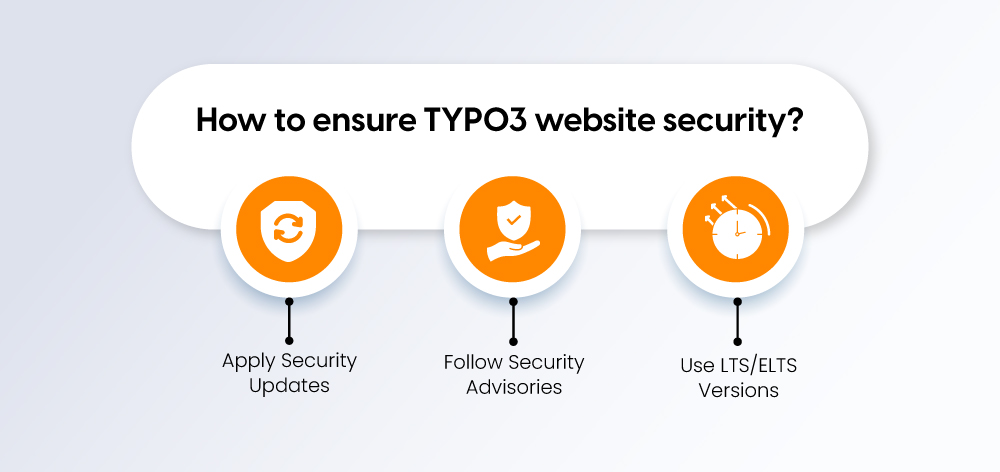
The security of your TYPO3 website begins with understanding the system's core security features and best practices.
TYPO3 Core Security
TYPO3 caters to both small businesses and large enterprises. Since several TYPO3 websites contain sensitive information, security is particularly important.
The TYPO3 Security Team is responsible for monitoring the system for vulnerabilities and publishing official security advisories. Security advisories provide developers and website owners with guidelines to quickly address vulnerabilities and ensure a secure environment.
Security Updates and Advisories
The TYPO3 Security Team releases updates as soon as a vulnerability is discovered. The updates include instructions for patching the core system, and the advisories contain recommendations for security practices. Following the advisories protects a website from known vulnerabilities.
Long-Term Support (LTS) and Extended LTS (ELTS)
The LTS version of TYPO3 receives regular security updates over several years. The Extended LTS (ELTS) provides additional support for organizations that cannot immediately upgrade to a newer version.
Using supported versions is necessary because unsupported versions no longer receive patches. Attackers exploit insecure and unsupported websites.
Security Updates and Patch Management
Updating TYPO3 is crucial for the security of the website. Updates fix security vulnerabilities, improve stability, and ensure that the website meets security standards.
How TYPO3 Releases Security Updates
The TYPO3 Security Team analyzes the core system and extensions for security vulnerabilities. When a vulnerability is found, an official advisory is published on how the system can be patched, usually classified by severity.
Comparison Chart: LTS vs ELTS vs Unsupported
Version | Updates | Support | Cost | Recommendation |
LTS | Regular | Community + Security Team | Free | Recommended for most sites |
ELTS | Regular | Paid extended support | Paid | For sites that cannot upgrade |
Unsupported | None | None | N/A | Avoid high risk |
Applying TYPO3 Security Updates
- Back up the website before the update
- Apply patches promptly, especially if they have a high severity rating
- Test updates in a staging environment before deploying them to production
- Regularly check TYPO3 security advisories
Risks of Skipping TYPO3 Security Updates
Running an outdated version of TYPO3 makes the website vulnerable to attacks, data breaches, as well as fines or downtime. Timely and consistent updates of TYPO3 are crucial to ensure that the website remains secure and reliable.
TYPO3 Extensions and Security
Extensions extend the functionality of TYPO3 websites, but improper use or lack of maintenance can also cause security issues.
TYPO3 Secure Extensions
TYPO3 provides documentation on secure extensions, which are also regularly maintained. It is important to choose extensions only from secure sources and to check the update history to minimize potential security vulnerabilities.
Some TYPO3 Extensions specifically focus on security, including:
- Secure Backend Password: Enforces strict password policies for all backend users.
- StaticFileCache: Improves website performance, security, and caching of static files.
- Backup Plus: Provides a backup solution, but can be insecure in certain versions.
How to Check TYPO3 Extension Security
One should ask the registrar to check the last update of the extension and review known secure extensions in the TYPO3 security advisories for potential issues. It is also recommended to test new extensions in a staging environment and in QA before deploying them to the production environment.
Auditing and Cleaning Up TYPO3 for Security
Regular audits or processes for extensions help identify unused or potentially risky extensions. Removing unnecessary extensions reduces the attack surface and ensures that the website runs more stably and securely.
TYPO3 Security and GDPR Compliance
The security of websites is crucial for protecting public data, especially in light of the strict German regulations on website access and data protection according to the GDPR. TYPO3 offers the ability to meet both technical and legal requirements, particularly the secure processing of personal data after consent has been given.
Legal Compliance
Disregarding the GDPR requirements can lead to high fines or other legal consequences. With TYPO3's functionality, organizations can systematically build data protection-compliant features, thereby reducing the risk of fines or issues with GDPR compliance obligations.
Data Protection Features
TYPO3 has numerous integrated and optional features to protect user data:
- Role-based access control: Ensures that only authorized users have access to confidential data.
- Encryption: SSL/TLS connections for secure data transmission as well as security headers that ensure secure browser connections against hacker attacks.
- Consent Management: Tools for managing user consents, including the anonymization of IP addresses and opt-in/opt-out mechanisms.
- Logging & Monitoring: Shows which users have accessed data and highlights potential security risks to promote transparency and accountability.
Risks of Non-Compliance
Without an adequate level of security and GDPR compliance, there is a risk of fines, business restrictions, reputational damage, or loss of customers.
TYPO3 Security Best Practices
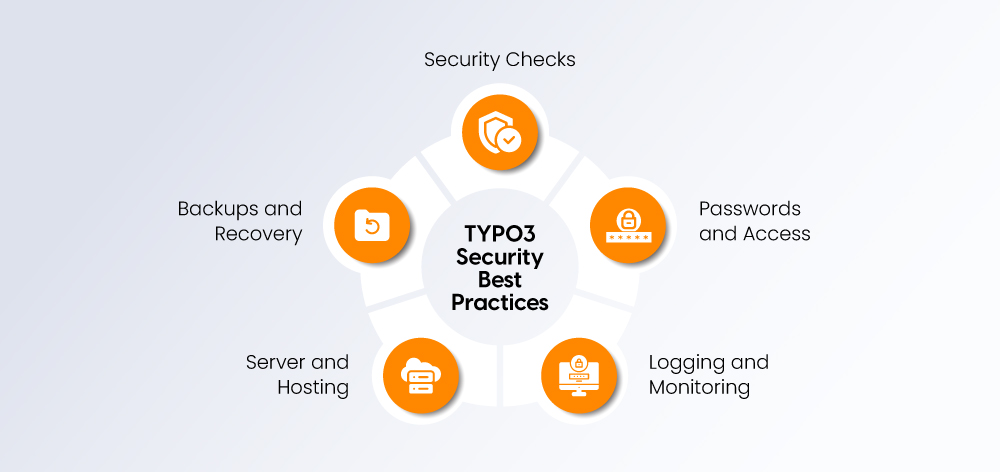
This includes far more than just updates and extensions; it helps ensure that your website is protected.
Passwords and Access
- Use strong and unique passwords for all users.
- Limit user access to what is necessary.
- Use two-factor authentication (2FA) for additional protection.
Server and Hosting
- Use SSL/TLS to encrypt data between the website and users.
- Choose a hosting provider with experience in TYPO3 CMS and security issues.
- Deploy firewalls to fend off unwanted traffic.
Backups and Recovery
- Regularly back up your website and database.
- Store backups in a secure and separate location.
- Test the recovery of backups to ensure they work in an emergency.
Logging and Monitoring
- Keep logs of user interactions and system events.
- Monitor access logs for suspicious files or activities.
- Use notifications for security-related incidents.
Security Checks
- Regularly conduct security scans to identify vulnerabilities on your website.
- If you process sensitive data, consult an experienced security tester.
- Fix discovered vulnerabilities as quickly as possible.
Following these procedures will help make your TYPO3 website stronger and more dependable.
TYPO3 Maintenance and Security Services
Regular maintenance and the integration of technical support significantly contribute to the security and performance of TYPO3 installations. Various providers offer services and packages with different focuses for this purpose.
TYPO3 Maintenance and Support Packages
TYPO3 maintenance and support packages typically include:
- Upgrades & Patches: Ensuring that the TYPO3 core and extensions are always equipped with the latest patches.
- Monitoring: Monitoring the website for errors, suspicious activities, and other security risks.
- Backups: Regularly backing up website data to enable recovery in case of problems.
- GDPR Compliance Check: Ensuring that the website meets legal data protection requirements.
- Security Audit: Reviewing the website to identify and fix security vulnerabilities.
Choosing the Right Partner for TYPO3
- Look for an agency with proven experience in TYPO3 security.
- Check if the agency has a track record and responds promptly to updates or support contracts (SLA).
- Consider a more locally based agency if you want more personal support.
- Also, ensure that the agency's pricing is transparent and that you receive clear information about which services are included in detail.
The use of professional TYPO3 maintenance services ensures security, reliability, and compliance. They relieve your company, allowing you to focus on your core business without having to deal with technical issues.
TYPO3 Security for Different Audiences
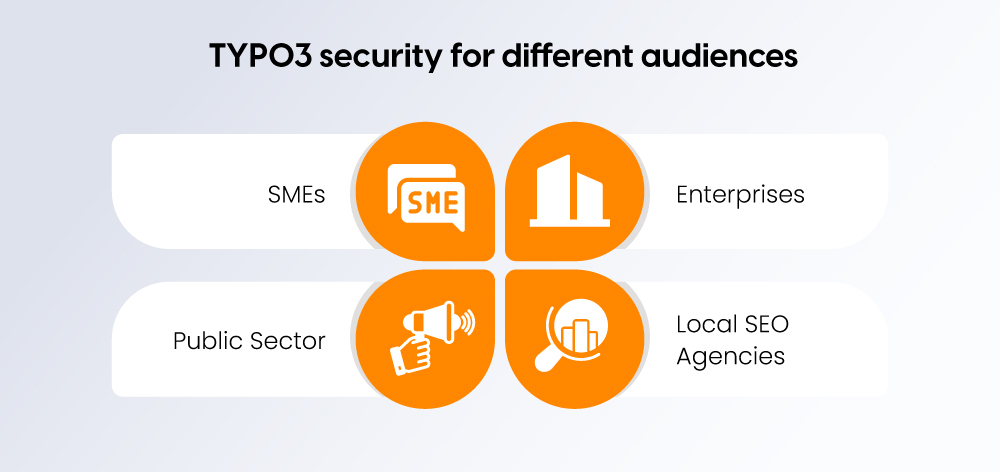
Every organization has different security requirements. TYPO3 offers the ability to customize these specific needs individually.
Small and Medium-Sized Enterprises (SMEs)
The focus here is on simple and cost-effective measures that are usually sufficient:
- Regular updates, backups, and a certain level of monitoring.
- Use of a ready-made extension for GDPR compliance and basic security measures.
Enterprises
- Further measures regarding security and GDPR compliance are required.
- This can include risk assessments, conducting audits, compliance measures, role-based access, and other measures.
- These are often associated with contracts for routine maintenance (professional practice) and ELTS support.
Public Sector
- Generally has a higher level of data protection and data transparency.
- The public sector is subject to high accountability, arising from legal obligations and sometimes from public trust.
- It usually requires a higher level of GDPR compliance and data protection, especially when handling sensitive data.
Local SEO and Regional Agencies
- Companies often look for TYPO3 security in their region and for a provider in cities like Berlin, Munich, or Hamburg that offers them personal support and ensures faster response times.
- You can target this audience by highlighting the value of regional expertise to attract customers.
By considering your audience, you can sensibly determine the right level of TYPO3 security measures, depending on an audience's level of protection, compliance, and reliability for each organization.
Conclusion
TYPO3 security is essential for protecting your website, user data, and your organization’s reputation. Regular updates, secure extensions, proper technical hardening, and GDPR compliance all work together to keep your site safe and reliable.
Investing in maintenance and security services helps prevent attacks, reduce downtime, and ensure legal compliance. Whether you are a small business, a large enterprise, or a public organization, following TYPO3 security best practices is critical.
Take action today: audit your TYPO3 website, apply the latest updates, review your extensions, and consider partnering with a professional TYPO3 agency to keep your site secure.

Is Your TYPO3 Website Properly Secured?
Learn how to review system updates, user permissions, hosting security, and configuration settings.
FAQ
To ensure your TYPO3 core and TYPO3 Extensions are up to date, check security configurations, enable strong passwords and 2-factor authentication and look for unusual activity in the logs. Regular auditing can reveal possible vulnerabilities.
Old versions of TYPO3 can create vulnerabilities that lead to attacks on your site, data breaches, or even downtime. This can even result in legal issues or consequences in cases of personal data being compromised. You should be sure to apply updates in a timely manner.
Implement data protection components such as consent management, access controls, encryption, and logging features. Use GDPR ready extensions, and regularly check for GDPR compliance as well as TYPO3 security guidelines.
Some security extensions for TYPO3 examples are Secure Backend Password, StaticFileCache, Backup Plus, etc. Always choose those that are actively maintained, up to date with a good rating, and ensure to delete old or unused extensions.
Professional maintenance services can help provide the TYPO3 updates, and monitoring, as well as backup services. They can check your website for security audits as well as your GDPR compliance and you will be assured that everything is been looked after.
Contact for Internet agency and TYPO3 projects
Sven Thelemann
Service Partner - Germany



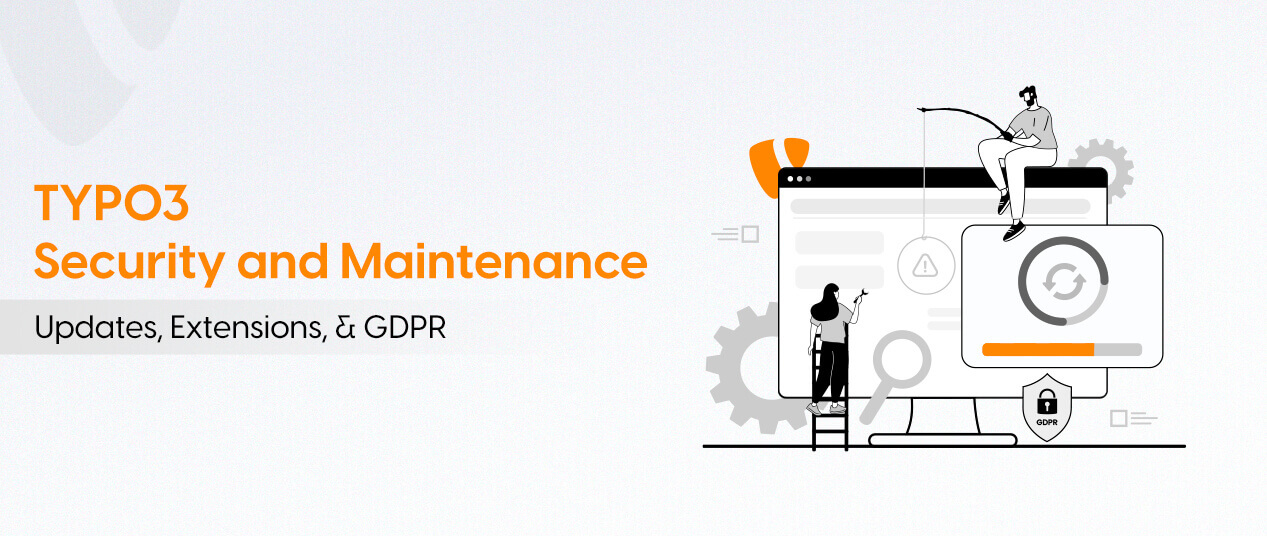
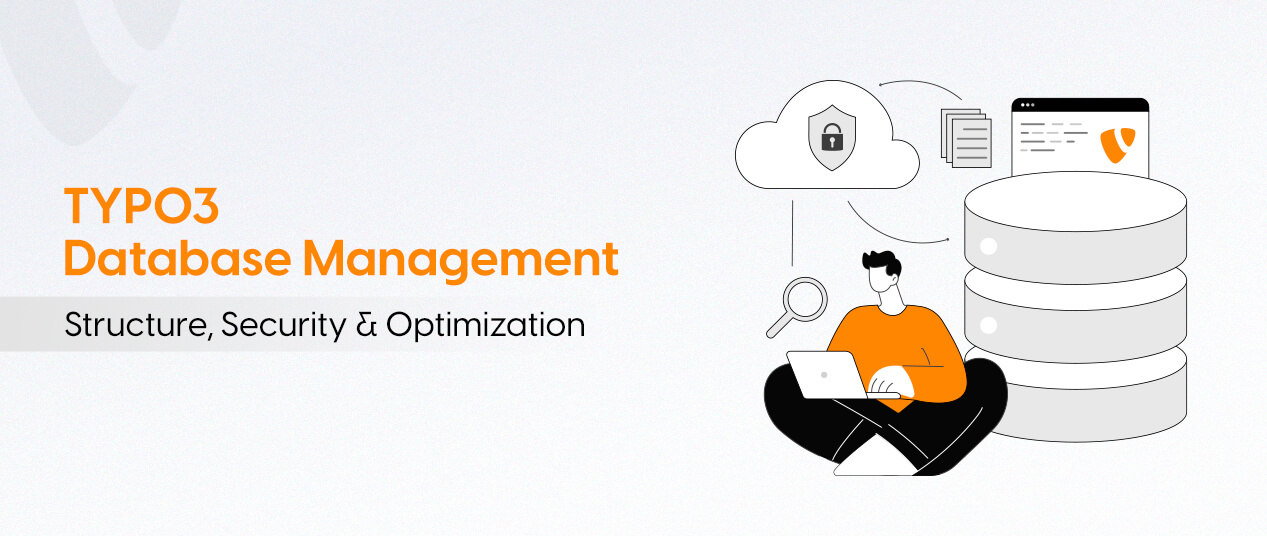
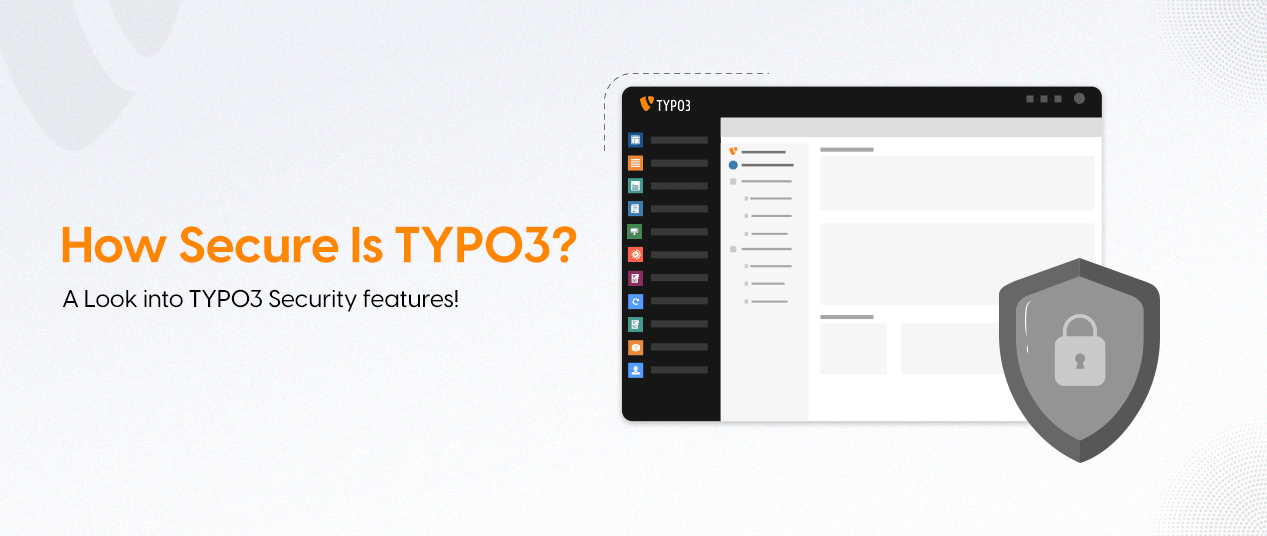
Be the First to Comment